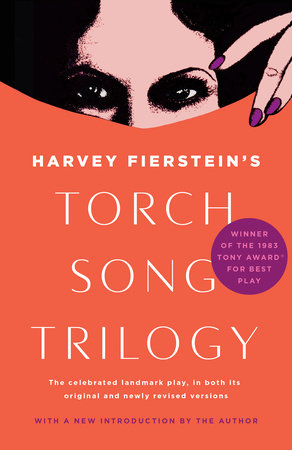Torch Song Trilogy
Plays
Harvey Fierstein
Paperback
September 25, 2018 | ISBN 9780525618645
AmazonBarnes & NobleBooks A MillionBookshop.orgHudson BooksellersPowell'sTargetWalmart
Ebook
September 25, 2018 | ISBN 9780525618652
AmazonApple BooksBarnes & NobleBooks A MillionGoogle Play StoreKobo
About the Book
A new edition of the classic drama portraying gay life in New York in the 1970s and 80s—winner of the Tony Award for Best Play, now back on Broadway in a revival hailed by The New York Times as “irresistibly compelling.”
What begins as a chance encounter in a New York nightclub leads drag performer Arnold Beckoff on a hilarious yet touching pursuit of love, happiness, and a life he can be proud of. From a failed affair with a reluctant lover to a committed relationship with the promise of a stable family, Arnold’s struggle for acceptance meets its greatest resistance when he faces off against the person whose approval is most important to him: his mother.
This edition contains for the first time ever both the original scripts for the three one-act plays (The International Stud, Fugue in a Nursery, and Widows and Children First!) as they were performed in the 1970s, as well as the revised script for the 2017 revival that condensed all three into Torch Song. It also includes a never-before-published introduction by Harvey Fierstein, as well as photographs from both the original production and the revival starring Michael Urie and Mercedes Ruehl and directed by Moisés Kaufman.
Praise for Torch Song Trilogy
“Harvey Fierstein has created characters so vivid and real that they linger in the mind, talking the night away, long after the lights have been turned out and everyone has left.”—Time
“Gorgeously funny . . . a devastatingly comic play with just the right resonances.”—New York Post
“Sassy, sweet, and moving.”—People
What begins as a chance encounter in a New York nightclub leads drag performer Arnold Beckoff on a hilarious yet touching pursuit of love, happiness, and a life he can be proud of. From a failed affair with a reluctant lover to a committed relationship with the promise of a stable family, Arnold’s struggle for acceptance meets its greatest resistance when he faces off against the person whose approval is most important to him: his mother.
This edition contains for the first time ever both the original scripts for the three one-act plays (The International Stud, Fugue in a Nursery, and Widows and Children First!) as they were performed in the 1970s, as well as the revised script for the 2017 revival that condensed all three into Torch Song. It also includes a never-before-published introduction by Harvey Fierstein, as well as photographs from both the original production and the revival starring Michael Urie and Mercedes Ruehl and directed by Moisés Kaufman.
Praise for Torch Song Trilogy
“Harvey Fierstein has created characters so vivid and real that they linger in the mind, talking the night away, long after the lights have been turned out and everyone has left.”—Time
“Gorgeously funny . . . a devastatingly comic play with just the right resonances.”—New York Post
“Sassy, sweet, and moving.”—People
Read more
Close




